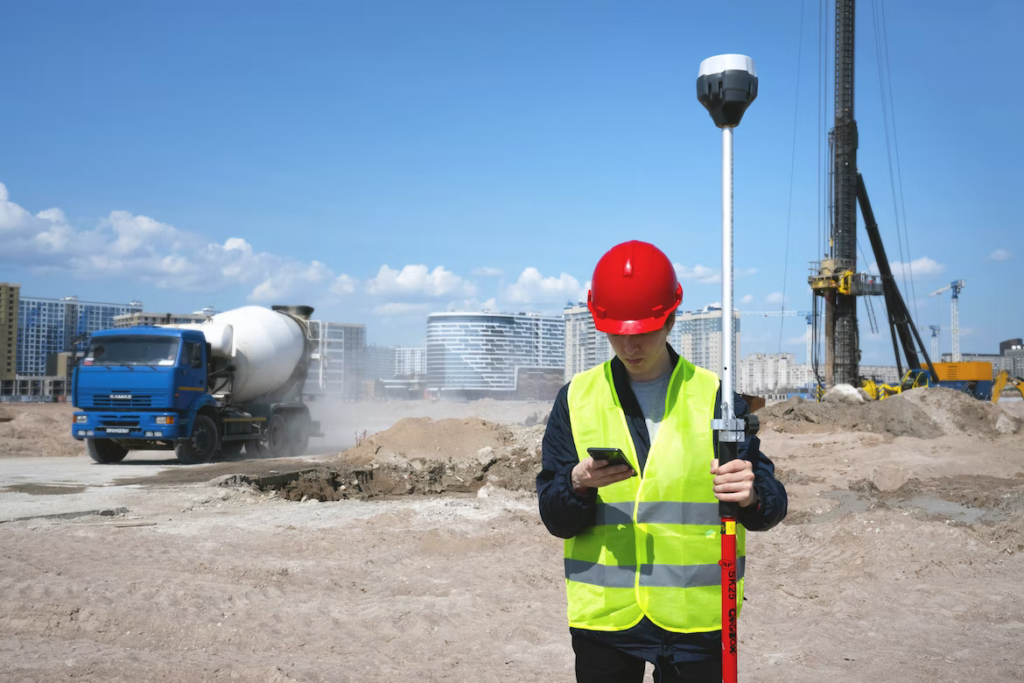
Land surveying is an essential component of planning and executing construction projects. It involves the careful measurement and mapping of land, as well as obtaining accurate topographic data that can be used in a variety of ways. Land surveyors use sophisticated equipment such as GPS systems, laser scanners, total stations, robotic total stations, and drones to measure angles and distances for precise calculations. By collecting detailed information about the terrain and features on a piece of property or construction site, land surveyors can provide clients with valuable insights into how best to proceed with their project.
This blog post will explore the various uses of land surveying in construction projects and discuss some common challenges faced by surveyors when working on such complex tasks. So whether you’re an engineer, architect, surveyor, or just a curious reader interested in learning more about land surveying for construction projects, keep reading to find out all you need to know!
Laying Out Construction Sites
Before any construction can take place on a property, land surveyors must first establish the boundaries of the future project site. By the time construction is complete, post construction services will be needed, so it’s important to understand what kind of site is being made use of. This involves carefully measuring the angles and distances of the site using GPS systems, total stations, robotic total stations, and drones. Land surveyors use this data to create detailed maps that will be used to guide architects and engineers as they plan their projects. Depending on the size and complexity of the project, land surveyors may need to establish multiple control points on the property to ensure accuracy.
For instance, a surveyor working on a new shopping center might measure several points within the boundaries of the site to ensure that all structures are being built in the correct locations.
Determining Elevations
In many cases, land surveyors may also need to measure the elevation of the project site to ensure that all structures are built on a stable foundation. This is especially important on sites with steep slopes or uneven terrain.
For instance, in Calgary, many areas have a high water table, so it’s important to accurately measure the elevation to ensure that buildings are not at risk of flooding. So if you plan on building a deck, a garage, or any other structure on your property in Calgary, finding reputable land surveyors experienced in serving Calgary, Red Deer, and surrounding areas is a must. Using lasers and drones, land surveyors can generate detailed topographic maps that provide information about the elevation changes across a property so that construction crews know exactly where to begin building.
Identifying Potential Hazards
Land surveyors also need to be aware of any potential hazards in the area, such as sinkholes, unstable soil, and flooding. By carefully studying aerial photographs and topographic maps, land surveyors can identify areas that may pose a hazard to construction workers or those who will occupy the finished product.
In some cases, it may even be necessary for surveyors to examine current utility lines and underground cables before any construction takes place to avoid damaging them during excavation. Knowing this information ahead of time can help builders save time and money by avoiding costly repairs after the fact.
Teaming up with the best hydro excavation company can also help identify and uncover any underground hazards. The use of technology, such as ground-penetrating radar (GPR), has made this process more efficient and accurate.
Monitoring Construction Progress
Once construction begins, land surveyors are instrumental in monitoring the progress of the project. By taking regular measurements and comparing them to the data obtained during the initial survey, they can ensure that buildings are being constructed according to plan. Furthermore, land surveyors can use this information to create detailed reports for clients that outline the current status of their projects. This can be incredibly useful for architects and engineers when making decisions about how best to proceed with their work. Even if there are delays or unexpected changes to the project, land surveyors can quickly adjust their data and provide clients with valuable insights into how best to proceed with their project.
Final Inspections
Finally, land surveyors are also responsible for conducting final inspections of a project once it’s completed. By verifying that the structures have been built according to plan and ensuring that all safety standards have been met, they can help ensure that the site is safe for occupancy. In addition, land surveyors can also evaluate any potential environmental hazards and provide clients with recommendations on how best to address them. This way, everyone involved in the project can rest assured knowing that their work has been done properly and safely.
With all of these uses for land surveying in construction projects, it’s easy to see why they are an integral part of the process. A skilled and experienced land surveyor is key to ensuring that all aspects of a construction project run smoothly and efficiently. From laying out sites and determining elevations to identifying potential hazards and monitoring progress along the way, surveyors play a vital role in helping architects, engineers, and builders create beautiful buildings that will stand the test of time. So if you’re planning on starting a construction project anytime soon, don’t forget to call your local land surveyor!













